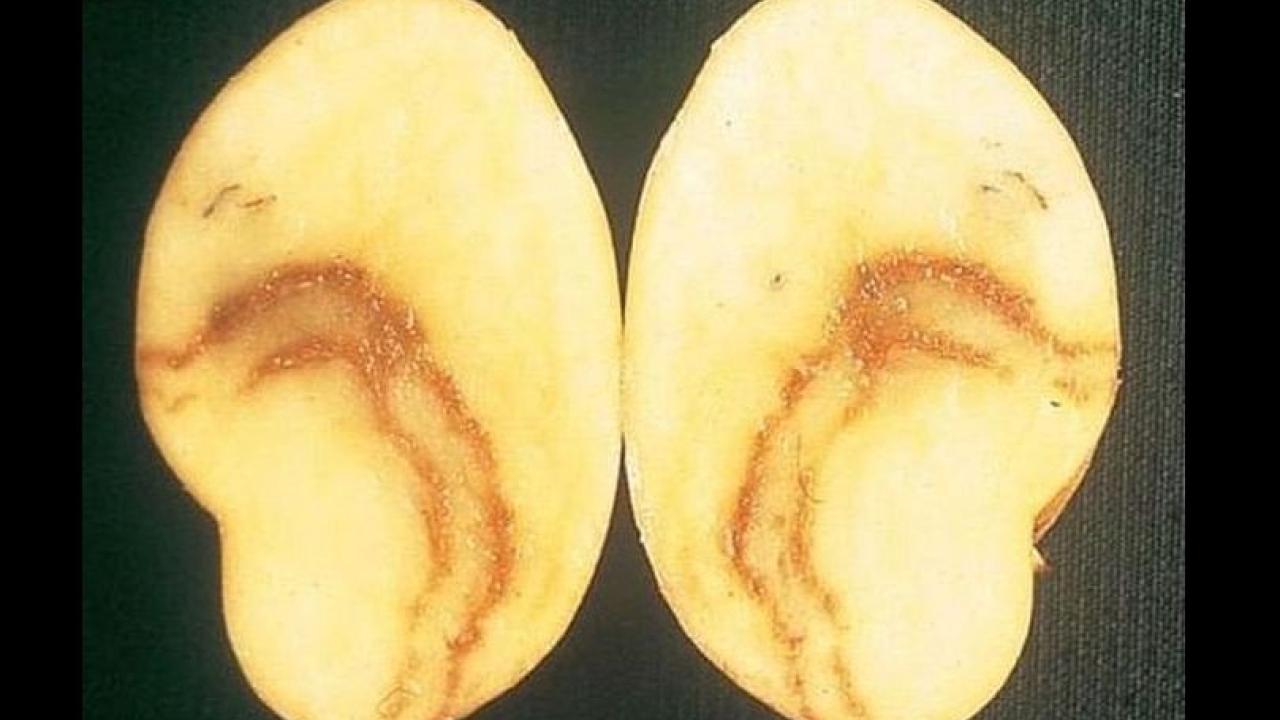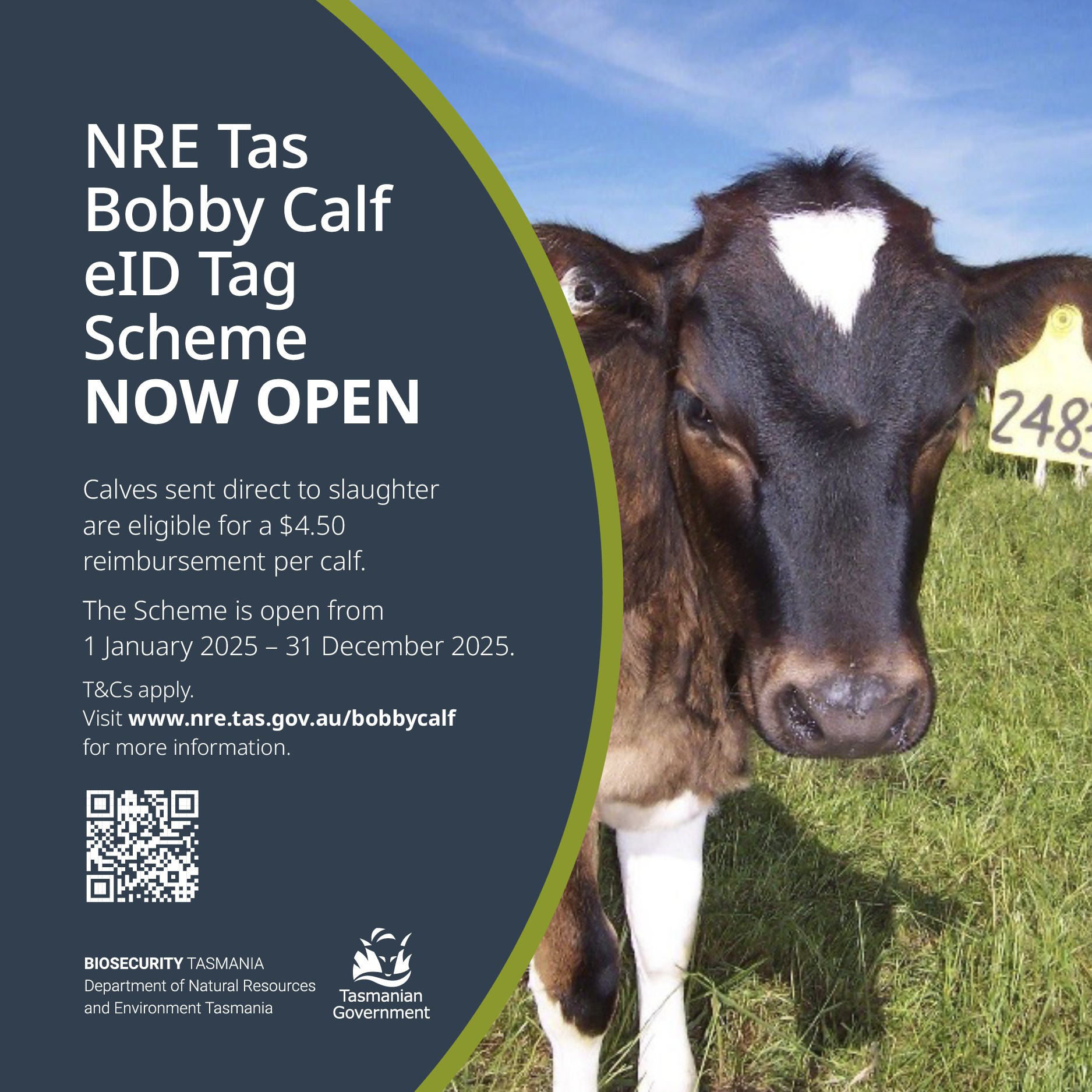Mop-top virus detected at four additional sites

Mop-top virus has been confirmed at four additional sites, with Biosecurity Tasmania admitting the potato disease may have been present in the state for at least two years.
The new infection sites are all located in the northern half of the state and two of those cases involve seed potatoes.
Four of the six sites have direct links to the second confirmed location of the virus, which was a small research plot in southern Tasmania where volunteer potatoes grew.
The Mop-top virus is carried and transmitted by the soil-borne pathogen that causes powdery scab in potatoes, which is common in Tasmania.
Affected potatoes can display symptoms such as distortions to the skin; deep cracking, and rust-coloured arcs, streaks or flecks in the tuber flesh; and yellow colouration on the leaves, but only in mother tuber infections only.
A Biosecurity Tasmania spokesperson said multiple potato varieties had been infected, but did not specify which ones.
“All sites identified as Infected Premises are issued a Biosecurity Direction under the Biosecurity Act 2019, restricting the movement of potato material, machinery and equipment, and soil from the sites.
“Early traceback activities indicate that the virus may have been present in Tasmania for at least two years.
“Biosecurity Tasmania continues to work with impacted growers and potato industry bodies to conduct additional surveillance and diagnostics of potato stock.
“They are also doing trace-forward and trace-back operations to determine the potential distribution of the virus, and possible infection pathway.”
Despite the growing number of mop-top cases, TasFarmers CEO Nathan Calman said his organisation was not aware of any looming export restrictions for the state’s potato exports.
“Many of the seed potatoes sown in Victoria are sourced from Tasmanian growers,” Mr Calman said.
“Any import restrictions into Victoria would potentially have a negative impact on producers in Tasmania that currently have that as one of their crop rotations.
“The total processed potato industry within Tasmania is getting close to $1.5 billion.
“It’s a huge industry and we’re not talking about a scenario here where the industry would be shut down completely as a response to mop-top.”
Mr Calman praised Biosecurity Tasmania’s response to the detection of the virus.
“It’s always a positive that the trace forward and trace back process has identified other sites that are impacted, because without that, the disease has the potential to spread uncontrolled,” he said.
“But knowing that there’s a second site, it does create a higher level of concern around the spread of the disease.
“It’s probably not likely that we’ll find more sites in the future just through the process that the government are now following.”
There was concern among potato growers about the potential spread of mop-top, Mr Calman said.
“Potato growers really just want to be part of the solution and want to be kept informed.
“They’re at an important time of the year where they’re deciding what crops to grow for the season ahead and want to be informed about how the biosecurity response could impact their own operations.
“As more sites are detected in the future, we need to make sure that producers are part of the conversation around how the disease is managed or eradicated so that they’re able to share their important experience around the growth and management of this crop because they’re probably some of the biggest experts that there are.”
Mr Calman said potato farmers should review their biosecurity plans.
“They should make sure that the plans they have in place consider all of the current risks that exist in the Tasmanian environment, and this is a new risk.
“Farmers should be making sure their biosecurity plans are actually being followed – making sure that planting or harvest equipment that is coming onto your property is completely cleaned and sterilised before it enters the site, as well as making sure that records are kept of equipment and contractors that are used.”
Shooters, Fishers and Farmers MP Carlo Di Falco said there needed to be urgent measures to protect the state’s potato growers from mop-top.
“Tasmania’s farmers are the backbone of our economy and our communities,” Mr Di Falco said.
“The emergence of mop-top is deeply concerning, not just for growers but for the many jobs and businesses that rely on this vital industry.
“We need to support our local farmers, as this could have a significant impact on their livelihoods.
“The government should be considering assistance packages, should they be required.”




Add new comment
Comments
Information desert
Tas Country has now produced several articles on the mop top virus.
Not one of them has described what an infected potato top looks like.
This is critical information for farmers and home gardeners.
We may all unwittingly have affected potatoes in our plots.
RE: Information desert
Hi Bob, the article has been amended to include information about what an infected potato looks like.
Bio security plan
I doubt there are very few farmers that have a comprehensive bio security plan or have been given the resources and training to fully understand how to develop and implement one.